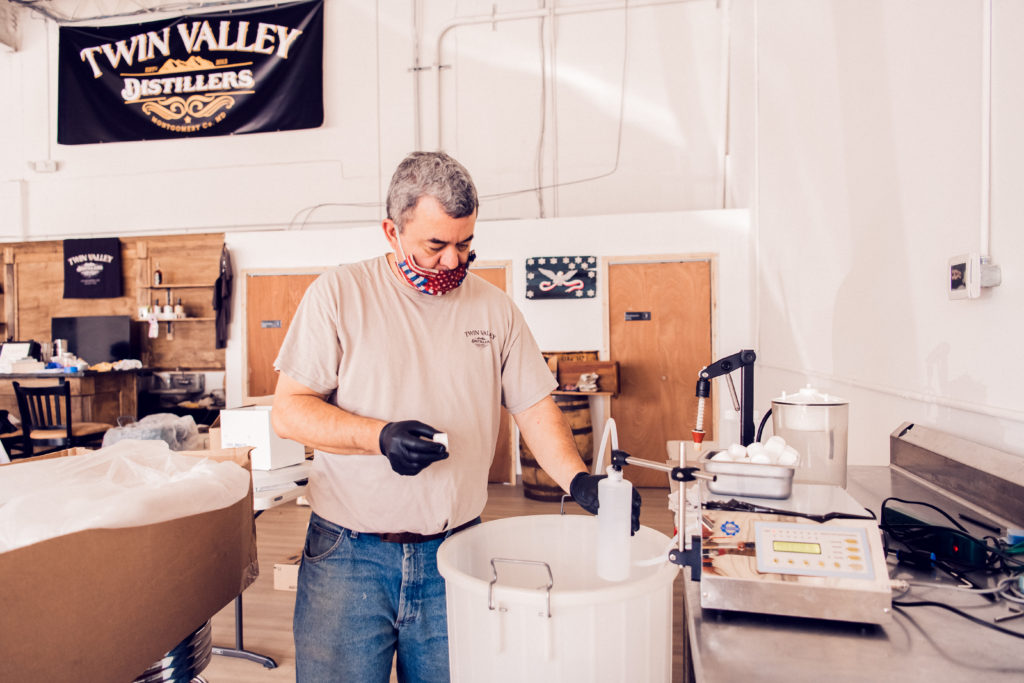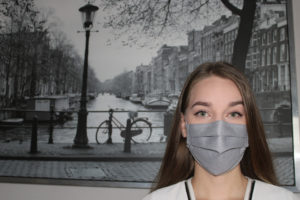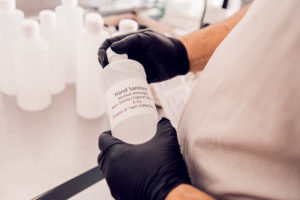
Last year was an excellent one for Shapeez, the Gaithersburg-based lingerie company, purveyor of the Unbelievabra and other body-enhancing underthings. So good, in fact, that CEO David Berner paid off the company’s debt and didn’t renew its lines of credit. This year looked even better.
Then came the pandemic. For Shapeez, the 200-plus stores selling their product—gone. Wholesale business—gone. Online sales— two-thirds … gone.
Still, the company had factories that cut and sew. Women may not be buying, or wearing, bras while they’re sheltering-in-place, but everyone is wearing masks and needing more. So Shapeez is filling that need.
With orders already in the tens of thousands, Berner says the goal is to erase most of the red ink. “This is hardly a get-rich scheme,” he says. “Our bras cost $89. You have to sell a lot of masks to make that much.”
A Hit to the Economy
Months must pass before an accurate picture of COVID-19’s impact on Montgomery County businesses is known. Between early March and May 1, more than 42,000 of the county’s 560,000 employees in 32,000 businesses have filed for unemployment. More than $600 million in tax revenue may be lost.
“The hit to our economy in the county is going to be in the billions,” says Georgette “Gigi” Godwin, CEO of the county Chamber of Commerce.
A report in early May by Montgomery Planning and the Montgomery County Economic Development Corporation predicts that more than one quarter of all wage and salary jobs could be lost. The hardest hit sectors, the report says, will be Food and Beverage (just over 12,000 employees); Accommodation and Food Services (35,500) and Administrative, Support and Waste Management (35,000), which includes janitorial and landscaping services.
The tally of business failures and financial losses will be tempered somewhat by federal, state and county aid programs. The federal Paycheck Protection Program is finally providing funds after a controversial start; the county has chipped in with $25 million in grants for small businesses and nonprofits, with $10 million set aside for restaurants and retail shops.
The state Public Health Emergency Grant Program is providing small businesses and nonprofits that have 100 employees or less with grants of up to $75,000.
More than 6,700 applications were filed with the County during the application period of April 15-25. As of May 7, 1,205 applications had already been funded, had been approved or were in the process of being approved.
“We’re waiting to see how these government funds can help these businesses,” says Kristin T. O’Keefe, vice-president of communications and marketing at ECD, a county-funded nonprofit promoting economic development. Her organization has created a $200,000 fund designed to support businesses that are changing or enhancing their operating models to manufacture Personal Protection Equipment (PPE).
Although the grants will help, says County council member Hans Riemer, “there is nothing we can do that will replicate having these businesses re-open, which will only happen when we get the virus under control.”
Getting Creative to Retain Customers
At ground level, when the numbers assume human form, the stories can be heartbreaking. Yet, as Shapeez demonstrated, there are ways to lift your chances of survival. If necessity is the mother of invention, then COVID-19 may have created the mother of all necessities.

After a balky start, says Berner, Shapeez is hoping to produce 1,000 masks a day. “In our first design, the pleats on the mask went up instead of down, as they should. Re-tooling is not like turning on a dime,” says Berner. “Our goal was to keep our business operating, keep our employees working.”
Brothers Sew & Vac has been selling and repairing sewing machines and vacuum cleaners across the county for more than 60 years. The pandemic forced them to close all four retail locations. Founding family member Paul Morris decided to work out of his Rockville kitchen, taking orders for new machines and personally delivering them to customers’ homes.
“I’m on the phone eight hours a day, getting an average of 200 calls—about 10 percent resulting in sales,” says Morris. “Repairs are too complicated. But I’ve been ordering Husqvarna Viking sewing machines by the pallet. I deliver them in my electric Tesla. The Sebo vacuum cleaners are shipped directly to the customers. I can’t pay the rent or the mortgage, but I’m proud to say our eight employees are still being paid.”
Gayle Herrmann’s name is well known to Bethesda-area teenagers and adults alike for her Mustard Seed consignment store. In May 2017, after selling that successful business, she opened Oak in Kensington, selling new clothing “for adult women who want to be casual but hip.” She turned a profit her first year and was confident enough towards the end of 2019 to place orders for spring merchandise.
“I had to get creative when I was forced to close the shop,” says Herrmann. So, using available technology, she became an online personal shopper. “I connect from the shop to a customer on FaceTime and take them through things they might like,” she says. “They can see the garment, the texture and I’ll even try on clothes for them. Then I deliver whatever they buy to their homes in my car.”
Herrmann says only about 25 percent of the clothing is returned. The model has been so successful, she says that she may continue it when Oak is allowed to re-open. “Today I’m shopping for a mother and her daughter whose home burned down,” she says. “This is not exactly what I wanted to do, but what choices did I have?”
 At Twin Valley Distillers in Rockville, they also had a choice. With the closure of many farmer’s markets—a major sales venue for their bourbons, whisky and rums—business was off by one-third, says general manager Jonathan Shair. Drinking was optional; hand-washing was not, so the owner’s wife— a doctor and pharmacist—said, “Let’s make hand sanitizer!”
At Twin Valley Distillers in Rockville, they also had a choice. With the closure of many farmer’s markets—a major sales venue for their bourbons, whisky and rums—business was off by one-third, says general manager Jonathan Shair. Drinking was optional; hand-washing was not, so the owner’s wife— a doctor and pharmacist—said, “Let’s make hand sanitizer!”
Switching production to hand sanitizer has proven a great success. “At first we were just trying to keep the business afloat and take care of our employees,” Shair explains. “Now we’re trying to do what we can to help.” He estimates they’ve produced “a few tons” of sanitizer, which they sell in 8-ounce bottles or 5-gallon buckets for commercial enterprises.
A “booze mobile” is making deliveries, but Shair jokingly cautions against any sanitizer-based cocktails.
Recovering from Coronavirus
Most analysts see a slow recovery for local businesses. “It won’t be like turning the light switch from off to on,” says Chamber CEO Gigi Godwin. “It will be more like a dimmer switch, gradually raising the level of activity.”
Another question is what pandemic-inspired innovations might continue. Will the use of online platforms for communication and conferencing continue? Will open plan offices have to revert to cubicles?
O’Keefe, perhaps speaking for many, is hoping the spirit of community and altruism exhibited by consumers and businesses alike survives. “While we’d all like to wipe out COVID-19 tomorrow, that generosity of spirit is one outgrowth that should remain,” she says. “We’ve all been changed by this.”




